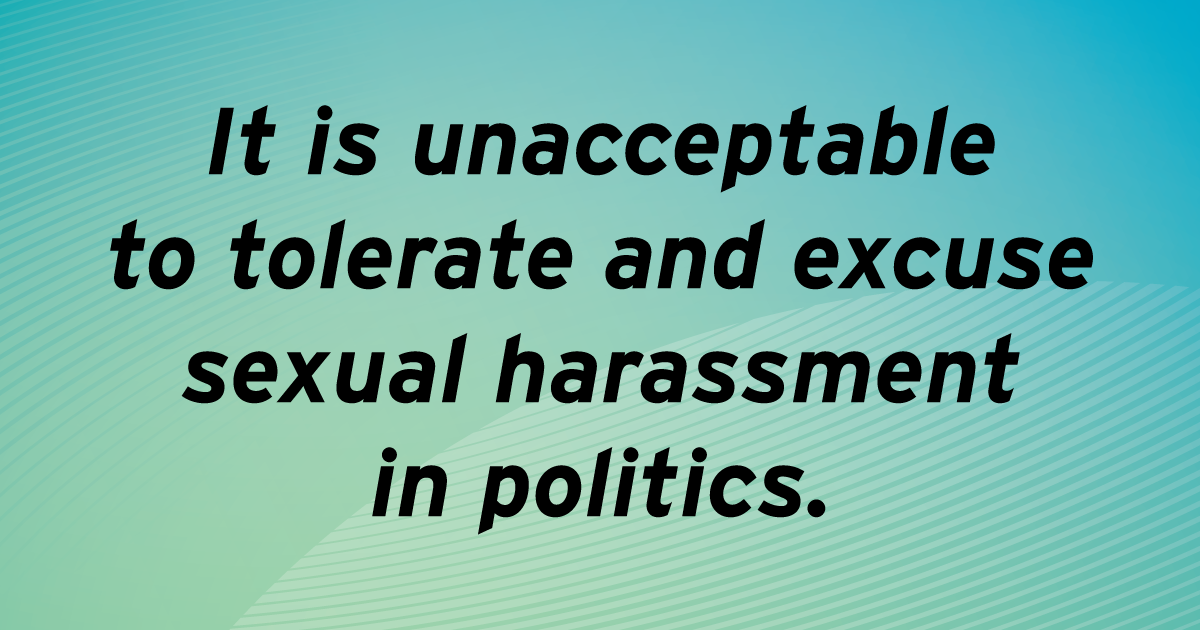
At least three women have reported sexual harassment by New York Governor Andrew Cuomo, as political leaders across the country face similar claims of inappropriate behavior. It is unacceptable to tolerate and excuse sexual harassment and discrimination in politics. Our leaders have the opportunity and responsibility to help support survivors and further the prevention movement in a constructive way.
Sexual harassment is a pervasive problem, especially for women.
- One in two women (49%) and nearly one in five men (18%) have been sexually touched in an unwelcome way (Kearl, 2019).
Sexual harassment encompasses all unwanted verbal or physical contact of a sexual nature. This includes a wide range of behaviors from inappropriate statements, lewd gestures, leering behavior, sexually explicit or suggestive jokes, emails or texts, and offensive objects or images.
Sexual harassment is defined by its impact on the victim, not the intent of the person whose behaviors are in question.
Excusing sexual harassment as unintentional is not acceptable. Attitudes that minimize these behaviors only further contribute to the problem and are why survivors most often never come forward. We need to support anyone that has been threatened or harassed by letting them know that what has happened to them isn’t their fault, they didn’t do anything wrong, and are supported.
Workplace sexual harassment will remain a persistent problem until it is taken seriously.
- 60% of women experience unwanted sexual attention or sexual coercion, sexually crude conduct, or sexist comments in the workplace (Feldblum & Lipnic, 2016).
- Upwards of 85% of people who experience sexual harassment never file a formal legal charge, and approximately 70% of employees never even complain internally (Feldblum & Lipnic, 2016).
Victims are most often afraid to report. They are afraid they won’t be believed, that the behaviors won’t be addressed, that they themselves will be blamed, and that they will face social and professional retaliation. Victims also fear that the behaviors will further escalate, and they bear the undue burden of attempting to avoid the harasser.
The impact of sexual harassment in the workplace is real and damaging.
Victims of sexual harassment experience negative psychological, work, and health consequences. It’s not just the one-time impact of the harmful behaviors that is important to recognize — it’s how these experiences continue to shape the victim’s life on a daily basis and their career and livelihood in the long-term. No one should have to choose between being able to provide for themselves and their family and feeling safe.
We must hold those who commit harm accountable, especially when they are in a position of power and authority.
People who commit acts of sexual violence sometimes abuse celebrity or authority status and the illusion of trust that comes with it. People who sexually abuse can have strong social ties in the community.
The public and private actions of leaders at every level, regardless of political party, must be taken into account as they have a responsibility to be a part of the solution to end sexual violence.
Learn more: https://www.nsvrc.org/tips-ending-sexual-assault-and-harassment-workplace
References
Feldblum, C. R., & Lipnic, V. A. (2016). Select Task Force on the Study of Harassment in the Workplace: Report of the Co-Chairs of the EEOC. Equal Employment Opportunity Commission. https://www.eeoc.gov/select-task-force-study-harassment-workplace
Kearl, H. (2019). Measuring #metoo: A national study on sexual harassment and assault. Stop Street Harassment. https://stopstreetharassment.org/wp-content/uploads/2012/08/Executive-Summary-2019-MeToo-National-Sexual-Harassment-and-Assault-Report.pdf
About NSVRC
The National Sexual Violence Resource Center (NSVRC) is the leading nonprofit in providing information and tools to prevent and respond to sexual violence. NSVRC translates research and trends into best practices that help individuals, communities and service providers achieve real and lasting change. The center also works with the media to promote informed reporting. Every April, NSVRC leads Sexual Assault Awareness Month (SAAM), a campaign to educate and engage the public in addressing this widespread issue. NSVRC is also one of the three founding organizations of RALIANCE, a national, collaborative initiative dedicated to ending sexual violence in one generation.
